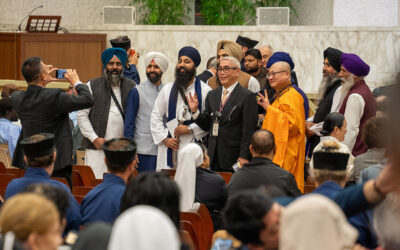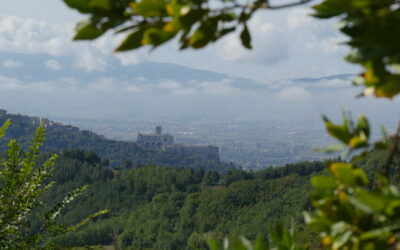 Lucia Abignente is part of the Chiara Lubich Centre: A documentation Centre, also a study centre, a centre of scientific research and promotion of the historical figure of the foundress of the Focolare Movement. Saints are witnesses of the faith who are recommended as examples by the Catholic Church: what is the example that Chiara Lubich gives? Abignente: […] her life has always stood out due to the passing on to others of the purest joy of faith. In the beginning of the ‘40s, a priest told her: “God loves you immensely”. This certainty, that became the foundation of her life, was immediately shared by Chiara: not only “I” am loved by God, but he loves all of “us” immensely. Hers was never an individual journey but it has always had the character of universality. This is also what happened in her journey towards sanctity. “To become saints together” she repeated to us. Because of this she has always made us participate in whatever God made her understand, so as to walk together towards Him. “That all may be one”: this was the desire and the goal of the life of Chiara up to the end […] The President Maria Voce explained that from all over – even from representatives of other churches and religions – the hope was expressed that this process could be initiated … Abignente: The ecumenical dialogue, that of interreligious dialogue and the one with persons of other convictions were born quite naturally in the Focolare Movement, determined by circumstances rather than by a theoretical intention. The first to enter into dialogue were the German Evangelicals in 1961. They were touched by the experience of Chiara, of how she lived the Gospel, eversince 1944, during the war, in the bomb shelters, when she would read the Gospel with her companions and together they tried to put it into practice. Chiara was especially close to Athenagoras, the Patriarch of Constantinople […] The persons of other confessions or religions and also those with no religious convictions felt the humanity of Chiara which attracted them and rooted them in her life of the Word. For this reason, we too look at the starting of this journey as something that does not divide, even with its external signs, respect for brothers of other faiths or other experiences because the sanctity based on the Bible must invite others to a more profound joining in the journey towards God or towards the non-religious moral values that we share with persons of other convictions. How will you accompany the journey that starts today? Abignente: We have undertaken a great task beforehand, of gathering all the published writings of Chiara that will be examined in the beatification process. We are dealing with thousands of pages. We must also include the research documents, also documents that have never published before, that come from the different sources of the archives of the Movement. In these years after her passing, the memory of Chiara has always remained alive and on the anniversary of her death, March 14, there have been many Eucharistic celebrations often presided by Bishops and meetings and initiatives of all kinds. There is a “reputation of sanctity” that surrounds her person all over the world which are accompanied by signs of graces received that have been communicated to us. We don’t know how things will evolve but what seems clear to us is that this journey (…) can help each one to deepen his or her relationship with God. Source: Chiara Santomiero, Aleteia, December 9, 2013
Lucia Abignente is part of the Chiara Lubich Centre: A documentation Centre, also a study centre, a centre of scientific research and promotion of the historical figure of the foundress of the Focolare Movement. Saints are witnesses of the faith who are recommended as examples by the Catholic Church: what is the example that Chiara Lubich gives? Abignente: […] her life has always stood out due to the passing on to others of the purest joy of faith. In the beginning of the ‘40s, a priest told her: “God loves you immensely”. This certainty, that became the foundation of her life, was immediately shared by Chiara: not only “I” am loved by God, but he loves all of “us” immensely. Hers was never an individual journey but it has always had the character of universality. This is also what happened in her journey towards sanctity. “To become saints together” she repeated to us. Because of this she has always made us participate in whatever God made her understand, so as to walk together towards Him. “That all may be one”: this was the desire and the goal of the life of Chiara up to the end […] The President Maria Voce explained that from all over – even from representatives of other churches and religions – the hope was expressed that this process could be initiated … Abignente: The ecumenical dialogue, that of interreligious dialogue and the one with persons of other convictions were born quite naturally in the Focolare Movement, determined by circumstances rather than by a theoretical intention. The first to enter into dialogue were the German Evangelicals in 1961. They were touched by the experience of Chiara, of how she lived the Gospel, eversince 1944, during the war, in the bomb shelters, when she would read the Gospel with her companions and together they tried to put it into practice. Chiara was especially close to Athenagoras, the Patriarch of Constantinople […] The persons of other confessions or religions and also those with no religious convictions felt the humanity of Chiara which attracted them and rooted them in her life of the Word. For this reason, we too look at the starting of this journey as something that does not divide, even with its external signs, respect for brothers of other faiths or other experiences because the sanctity based on the Bible must invite others to a more profound joining in the journey towards God or towards the non-religious moral values that we share with persons of other convictions. How will you accompany the journey that starts today? Abignente: We have undertaken a great task beforehand, of gathering all the published writings of Chiara that will be examined in the beatification process. We are dealing with thousands of pages. We must also include the research documents, also documents that have never published before, that come from the different sources of the archives of the Movement. In these years after her passing, the memory of Chiara has always remained alive and on the anniversary of her death, March 14, there have been many Eucharistic celebrations often presided by Bishops and meetings and initiatives of all kinds. There is a “reputation of sanctity” that surrounds her person all over the world which are accompanied by signs of graces received that have been communicated to us. We don’t know how things will evolve but what seems clear to us is that this journey (…) can help each one to deepen his or her relationship with God. Source: Chiara Santomiero, Aleteia, December 9, 2013
Find time to be recollected
Find time to be recollected




0 Comments